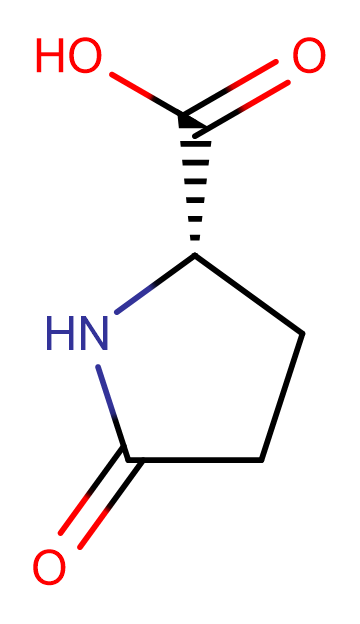
L-Pyroglutamic acid
CAS No. 98-79-3
L-Pyroglutamic acid( Pidolic acid | EINECS 202-700-3 | Glutimic acid | NSC143034 | NSC 9966 | NSC-9966 )
Catalog No. M16901 CAS No. 98-79-3
A cyclized derivative of l-glutamic acid. Elevated blood levels may be associated with problems of glutamine or glutathione metabolism.
Purity : >98% (HPLC)
 COA
COA
 Datasheet
Datasheet
 HNMR
HNMR
 HPLC
HPLC
 MSDS
MSDS
 Handing Instructions
Handing Instructions
| Size | Price / USD | Stock | Quantity |
| 500MG | 35 | In Stock |


|
| 1G | 42 | In Stock |


|
Biological Information
-
Product NameL-Pyroglutamic acid
-
NoteResearch use only, not for human use.
-
Brief DescriptionA cyclized derivative of l-glutamic acid. Elevated blood levels may be associated with problems of glutamine or glutathione metabolism.
-
DescriptionA cyclized derivative of L-GLUTAMIC ACID. Elevated blood levels may be associated with problems of glutamine or glutathione.
-
In Vitro——
-
In Vivo——
-
SynonymsPidolic acid | EINECS 202-700-3 | Glutimic acid | NSC143034 | NSC 9966 | NSC-9966
-
PathwayOthers
-
TargetOther Targets
-
RecptorUnusual Amino Acids
-
Research Area——
-
Indication——
Chemical Information
-
CAS Number98-79-3
-
Formula Weight129.11
-
Molecular FormulaC5H7NO3
-
Purity>98% (HPLC)
-
Solubilitysoluble in Water
-
SMILESO=C(O)[C@H](CC1)NC1=O
-
Chemical Name(S)-5-oxopyrrolidine-2-carboxylic acid
Shipping & Storage Information
-
Storage(-20℃)
-
ShippingWith Ice Pack
-
Stability≥ 2 years
Reference
1. Imming P, et al. Nat Rev Drug Discov. 2006 Oct; 5(10):821-34.
molnova catalog



related products
-
Thifensulfuron-methy...
Thifensulfuron-methyl is a sulfonylurea (SU) herbicide, has an important role in the removal of broadleaf weeds.
-
N-Formyl-L-methionin...
Effective in the initiation of protein synthesis. The initiating methionine residue enters the ribosome as N-formyl methionyl tRNA. This process occurs in Escherichia coli and other bacteria as well as in the mitochondria of eukaryotic cells.
-
S- (+)-Rolipram
S-(+)-Rolipram inhibits human monocyte cyclic AMP-specific PDE4 with IC50 of 0.75 μM, has anti-inflammatory and anti-depressant activity in the central nervous system, less potent than its R enantiomer.



 Cart
Cart
 sales@molnova.com
sales@molnova.com


